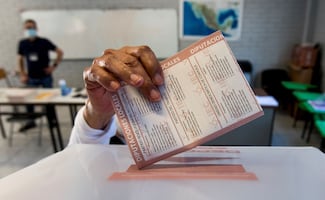Más Información

Trevilla narra operativo contra "El Mencho": pareja del capo fue clave; con voz cortada da pésame a familiares de compañeros fallecidos

Reportan que AICM opera con normalidad; van 58 vuelos cancelados y 11 demorados por violencia en Jalisco

Reforma electoral de Sheinbaum vuelve a atorarse por desacuerdo de PT y PVEM; iniciativa mantiene reducción de pluris y recorte presupuestal
In a village in San Juan Tlacotenco in the Tepoztlán municipality, it is common practice for girls between the ages of 13 and 17 to be traded for livestock. They're then forced to marry men within the community who “offer the most” for them.
That community is one of the many indigenous communities in the state of Morelos where this practice occurs, according to Fabiola del Jurado Mendoza, a member of the Indigenous Women Community Leaders Collective.
Families agree to sell their daughters between the ages of 13 and 17 to men up to 50 years old in order to pay for their family's expenses.
In San Juan Tlacotenco, at least two girls were recent victims of this act of human trafficking, one of them said she was raped by her own father and then attempted to sell and marry her off to an older man, according to the Collective.
Jurado Mendoza also said that the community is located a short distance away from the tourist attraction town of Tepoztlán. She says that many of the homes in the village are small brick homes with no services like toilets or showers.
She also said that as a result of field work carried out by the Collective, they were able to identify one man, who's an alcoholic and father, and who's married to a submissive woman; they live in a small home and in extreme poverty.
Unfortunately, said Jurado Mendoza, no one has come forward to date to file a police complaint related to these acts of human trafficking.
The girls who are sold live in a constant state of violence due to the pure nature of their forced marriage. They're sexually abused and shows signs of depression.
For this reason, the Collective of around 30 women visit these communities to work with women in order to improve their self-esteem and give them a sense of self-worth, and ultimately feel that they choose what they want to do with their bodies and lives.
Women from several different communities held a peaceful protest in the state's capital of Cuernavaca, as a way to share their stories and bring awareness to what many women go through in their homes.
According to Fabiola del Jurado, the violence that these women experience is a result of failed policies at both the state and government levels that have brought poverty, disease and a lack of public services such as plumbing and electricity, as well as a lack in education to, to these communities. This, she said, in some cases leads to parents offering their daughters in exchange for small amounts of money.
She said that recent legislation aimed to protect women from domestic abuse doesn't even mention the violence that exists in indigenous communities.
Fabiola del Jurado concluded by saying that, in addition to the extreme poverty that people in these communities live through, the hard work of women rarely goes noticed in these patriarchal communities, further exacerbating the situation of these young women and girls.
Noticias según tus intereses
[Publicidad]
[Publicidad]











